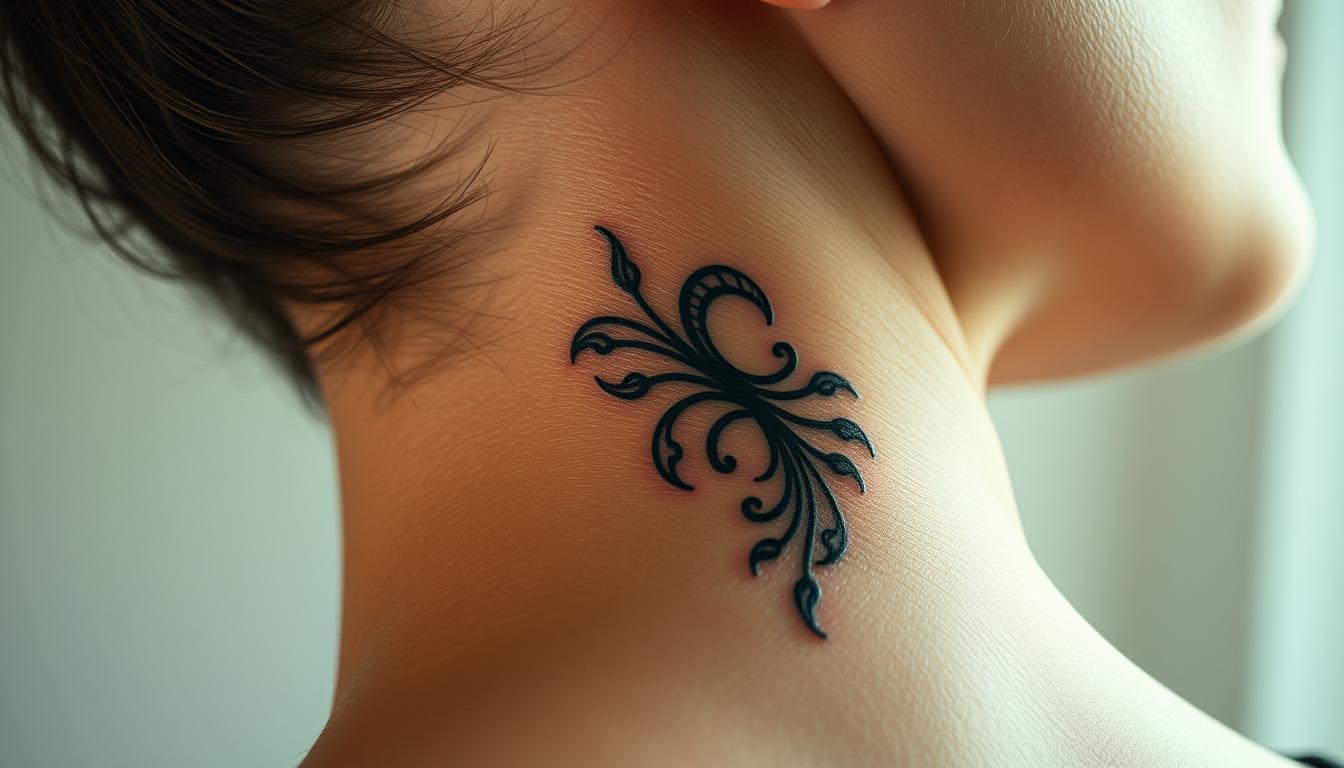
Curious which tiny design can make a big statement for your next ink? You’ll get a full guide that blends fresh inspiration with practical steps so you book and care for your piece with confidence.
This short guide shows why this compact placement pops in photos and how you can match designs to your style. You’ll find ways to pair small floral motifs, a rose tattoo, or bold celestial art with earrings and piercings.
Expect clear notes on pain, healing, and aftercare so your art looks great for years. By the end, you’ll have a simple plan: pick ideas, choose size, and schedule your session without second guessing.
Key Takeaways
- Get curated inspiration for compact placement and quick decision-making.
- Learn which designs suit contours and which photograph well.
- Understand pain, healing, and long-term care essentials.
- Find tips to communicate size and references to your artist.
- Walk away with a clear next step for booking and aftercare.
Why you’ll love the behind the ear placement
A discreet ink spot near the head and neck area offers big style payoff with low commitment.
It’s easy to hide or show. Wear your hair down for a private vibe or pull it back to display tiny pieces. This makes the placement ideal if you want visible art without a major lifestyle shift.
The curve where hair meets neck creates a natural frame that helps simple lines read crisp. You’ll also notice jewelry like studs and hoops enhance the look without competing with it.
Because the skin is thin and the area is compact, minimal designs can feel bold. Many artists have you lie down so your neck relaxes and the session stays comfortable.
Plan aftercare ahead: schedule your appointment around hair-wash days and make sure you have a gentle cleanser ready to protect fresh ink.
| Benefit | Why it works | Best for |
|---|---|---|
| Low-commitment | Easy to cover with hair or show off | First-time visible ink |
| Flattering frame | Ear curve and neck line enhance small designs | Fineline & minimal pieces |
| Simple aftercare | Compact area, quick clean routines | Busy lifestyles |
| Expandable | Works as a standalone or part of a larger body plan | Future neck or hairline work |
Trending behind ear tattoo ideas you can make your own
Small, well-placed ink can tell a big story—here are trends you can adapt to your look. Pick motifs that read at a glance and suit your daily routine.
Minimal fineline vs. bold color: choosing your style
Use the dot test: shrink your design to dime size in your mind. If the core shapes still read, the piece will work in this spot.
Black fineline stays crisp and ages predictably. Bright color pops against darker hair and stands out when your hair is up.
Micro pieces that make a big impact
- Tiny bee, crescent moon, or single star—these motifs carry weight in a small frame.
- Decorative swirls, sparkle accents, or mini chains link visually to piercings and studs.
- Number marks like 11:11 or a date fit the curve well; script should keep letter height even to avoid blur.
- When unsure, ask your artist for two stencil sizes and pick the one that reads from arm’s length.
Behind the ear tattoos design roundup
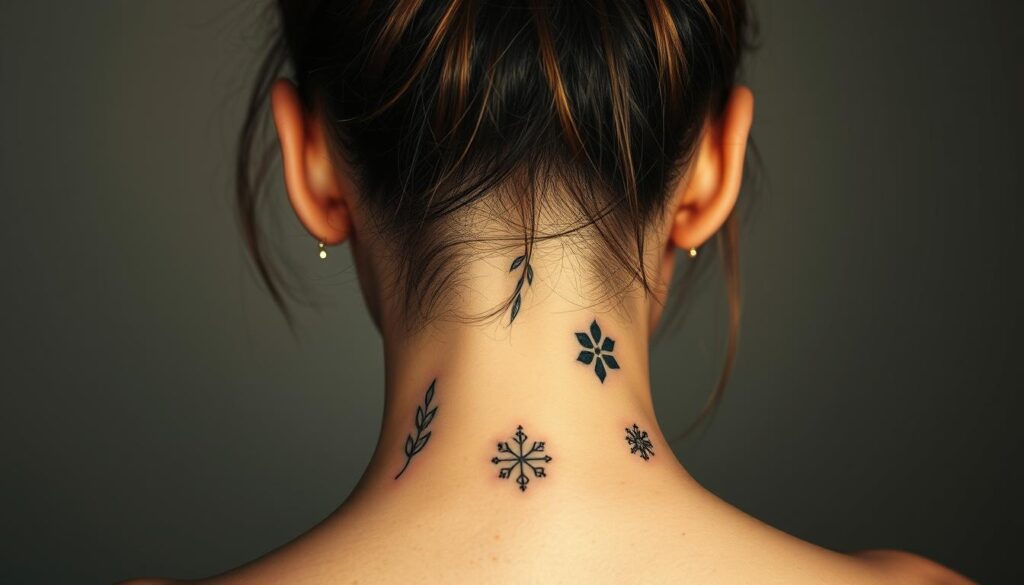
Small designs pack big personality; here are clear picks that read well near your neckline.
Butterflies and flying creatures
Go single-line butterfly for a whisper-light look. A tiny bee with a dashed flight path adds motion and pairs well with studs.
Roses and florals
A petite rose or a sprig of flowers tucks neatly under the helix. A single bud keeps things minimal while a slender stem elongates your ear line.
Feathers and wings
Slim feathers align with the back edge of the ear. A micro wing that tilts toward the temple creates a subtle lift in photos.
Stars, moons, and celestial sparkle
Cluster a crescent with three stars or add tiny sparkle accents for depth. Toss in a small heart for a softer touch.
Number and angel-number scripts
Choose 11:11 or a birth year and keep finger-width spacing so digits stay readable. Vertical layouts give a column effect; horizontal follows the fold.
Decorative accents that complement piercings
Dots, fine lines, and filigree can link lobes and helix jewelry. Repeat one motif across pieces for a cohesive look.
“Pick stencils at different angles so you can see how a design peeks from your hair and neck.”
| Motif | Why it works | Best for |
|---|---|---|
| Butterfly / Bee | Reads along the curve; suggests motion | Delicate, feminine looks |
| Rose / Flowers | Tucks under helix; elongates line | Classic, romantic art |
| Feather / Wing | Aligns with edge; adds lift | Elegant photos, minimal pieces |
| Stars / Numbers | Simple silhouettes; readable at a glance | Symbolic, numeric inspiration |
Script and word tattoos behind the ear
Scripted words can turn a tiny spot near your hairline into a personal signature. Mr. Inkwells lists script among top choices, and Stories & Ink notes it’s a common pick for this placement. You’ll want to focus on clarity and meaning.
Keep it short. Single words, initials, or a brief motto work best so each letter stays crisp as skin shifts and ages.
Pick a font that matches your voice. Monoline cursive feels soft. Small caps read modern. A subtle serif gives a classic touch.
Pair lettering with a tiny number like 11:11 or a small symbol to balance the layout. If you’re honoring someone, initials or a nickname feel intimate and easy to show.
“Bring two script references—one serif, one script—so you and your artist can compare stencil readability.”
Ask your artist for custom lettering that mirrors your handwriting if you want a unique mark. Opt for a moderate stroke; ultra-thin lines may fade faster outdoors.
| Tip | Why it matters | Quick action |
|---|---|---|
| Concise text | Preserves letter clarity over time | Choose one word or short motto |
| Font fit | Matches mood and legibility | Test monoline, small caps, serif |
| Pairing | Creates balanced micro-composition | Add a number or tiny symbol |
| Stencil test | Shows how it reads at mirror distances | Bring two references to your appointment |
Behind the ear tattoos for different styles and genders
You can tailor a compact piece to read distinctly feminine, masculine, or neutral. Pick shape, line weight, and finish to shift the mood without changing placement.
Ideas that read feminine, masculine, and truly unisex
Feminine-leaning: small flowers, a tiny rose, or sparkle clusters create a soft, delicate look.
Masculine-leaning: bold bars, dates, wings, or strong script bring a grounded, graphic feel.
Unisex options: simple symbols, numbers, or micro-shapes work for anyone and read clean from a distance.
- If you want subtle, go micro: a single glyph or thin line can feel chic on any gender.
- For organic vibes, choose feathers or a slender petal to follow the ear curve.
- Coordinate with jewelry finishes and ask your artist for a tiny rotation so lines sit true at side view.
| Look | Common motifs | Why it works |
|---|---|---|
| Feminine | Flowers, rose, sparkles | Soft curves read delicate and pair with studs |
| Masculine | Wings, dates, bold lines | Strong silhouettes read confident and clear |
| Unisex | Symbols, numbers, small icons | Neutral shapes suit varied hair and jewelry |
| Organic | Feathers, single petal | Flows with ear contour for elegant balance |
From subtle to statement: ear tattoo ideas that fit your vibe
Small placements can read subtle or bold depending on composition, color, and how you style your hair.
If you want subtle, try a single star, butterfly, or micro heart. These motifs sit neatly in a postage-stamp spot and pair well with studs or a tiny hoop.
For more statement, cluster two motifs—a crescent plus a sparkle, or a rose with a tiny script—to add depth while staying compact. Slightly heavier line weight or a half-inch extension down your neck increases drama without losing discretion.
Style tips: slick hair back to showcase the design, or wear tousled hair so it peeks out mysteriously. Minimal black lines age well; a blush petal or blue star boosts contrast for a pop of color.
- Combine micro script with a small icon for balance.
- Ask your artist for two stencils to test angle and fit.
- Pick a motif with quiet meaning so your mark feels personal and wearable.
“Statement doesn’t require size; a clean, high-contrast design can command attention even at micro scale.”
How much do behind the ear tattoos hurt?
Sensations change with technique: quick machine passes feel different than steady hand-poke taps. Because skin here is thin and sits close to bone, you’ll often notice sharper feedback and a low rumble that can travel up your skull.
Machine vs. hand-poke: what to expect
Machine: Most pieces in this spot are small and done fast by machine. You’ll feel fine vibrations and brief stings. Sessions are short, so discomfort rarely lasts long.
Hand-poke: This feels like repeated taps. Many find it gentler, but it usually takes longer and can mean more passes over skin.
- Expect sharper sensations near bone; vibrations can travel along your head and neck.
- Short sessions help keep the experience manageable, even if you’re sensitive.
- Ask to lie down or shift your head so your neck stays relaxed and muscles unclench.
- Breathe steadily and avoid clenching your jaw to reduce pain.
“Communicate comfort needs—artists can adjust position, speed, and angle to help you through the pass.”
| Factor | Machine | Hand | Quick tip |
|---|---|---|---|
| Sensation | Vibration, brief sting | Repeated taps, less buzz | Choose based on your tolerance |
| Session length | Short | Longer | Pick simple linework to shorten time |
| Comfort moves | Lie down, adjust head | Same options help | Ask artist before starting |
| Aftercare notes | Skin tender for hours | Same | Keep aftercare products handy |
Do behind the ear tattoos fade?
How long a micro piece lasts often comes down to sun care and simple maintenance. In theory, these marks don’t fade faster than other spots if you treat them well.
Sun exposure matters. When your hair is up you get more incidental light. Use SPF 50 daily on healed ink and cover up with a hat or scarf on bright days.
Design choice helps too. Simple silhouettes and clear shapes resist softening from years of skin movement and sun. Pick clean lines if you want long-term crispness.
Moisturize after healing and avoid harsh exfoliants on the back of your neck. Good early care stops heavy flaking that can blur fine details.
“Vibrancy is a partnership: your daily habits and mindful exposure keep small marks looking fresh.”
Quick care tips
- Apply SPF 50 every morning to healed areas.
- Wear hair down or use hats when outside a lot.
- Book an annual check-in for a tiny touch-up if needed.
| Factor | Why it matters | Quick fix |
|---|---|---|
| Sun | Drains pigment over years | Daily SPF 50 |
| Design | Complex lines blur faster | Choose simple designs |
| Aftercare | Prevents scabs and loss | Moisturize, avoid scrubs |
Tattoo aftercare behind the ear: what you should do
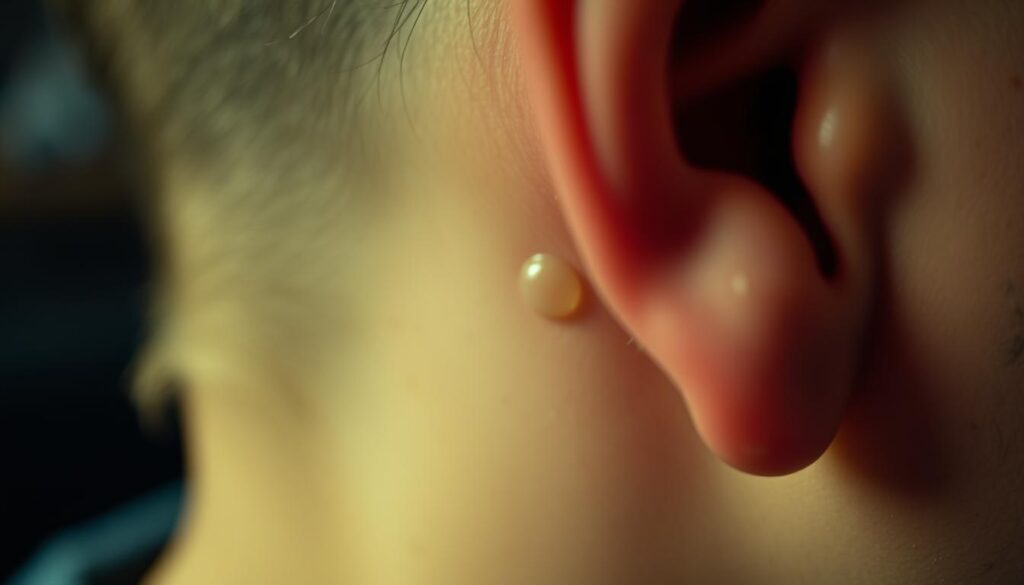
Fresh ink near your hairline calls for careful cleaning, light moisturizing, and smart protection. Start by rinsing gently with a mild cleanser and cool water. Pat dry with a clean towel or let the area air-dry—do not rub or scrub.
Cleaning, drying, and applying a thin layer of aftercare
Apply a whisper-thin layer of aftercare cream such as cocoa butter or your artist’s pick. A tiny amount prevents trapped moisture and helps scabbing stay minimal.
Repeat cleansing and moisturizing a few times daily for the first days, then taper as skin calms. Make sure to wash hands before you touch the piece and avoid pressing or picking at flakes.
Second skin, wraps, and keeping products off your fresh ink
If your artist offers second skin, it can protect this fiddly spot from stray hair and products. Follow removal timing exactly.
- A light wrap works for outings—change it as instructed to keep things sanitary.
- Keep hair products, perfume, and heavy sunscreen off the immediate area until fully healed.
- Avoid tight hats and over-ear headphones that add friction or pressure.
“Stick to your artist’s instructions—consistency in week one pays off with cleaner lines and smoother healing.”
How to wash your hair with a fresh behind ear tattoo
A few smart moves during showers will protect fresh ink and speed healthy healing.
Wash your hair right before your appointment so you can wait a day or two before the first post-ink rinse. Use dry shampoo and wear hair up to keep strands off that spot.
When you do wash, tilt your head so water flows away from the mark. Ask someone to help aim the spray if you can. A helper can reduce splashes and prevent soap on the new work.
Temporary cling-film taped lightly during showers also works. Remove it right after and follow your usual aftercare steps. Skip baths and pools until skin seals over.
- Keep conditioner and styling products away from the place around the piece.
- Blot—don’t rub—the back of your ear after showering and let it fully dry before applying moisturizer.
- Use a soft clip or scrunchie that won’t press on the area with tight elastic.
“Wash before your session and plan hair days ahead—small prep keeps ink clean and crisp.”
| Action | Why it helps | Quick tip |
|---|---|---|
| Pre-appointment wash | Delays first post-ink shampoo | Wash same day as your session |
| Dry shampoo & updo | Keeps strands off healing skin | Use for 2–3 days after |
| Tilt head / helper | Redirects water away from ink | Have someone aim the spray |
| Cling-film barrier | Protects from splashes in shower | Remove immediately after shower |
Prep tips before your appointment
Get your skin and mindset ready so your artist can focus on crisp lines and confident placement. Stories & Ink recommends keeping the area clean and well moisturized in the week prior. Simple prep reduces fuss on session day and aids healing.
Moisturizing & skin care
Moisturize daily for seven days so skin stays supple and holds ink cleanly. Skip heavy oils on the appointment day and stop new skincare products a few days before to avoid reactions.
Shaving baby hairs & wardrobe
Expect your artist to shave a few baby hairs for stencil adhesion—that’s normal and helps smooth passes. Wear a top with an open neckline and bring hair clips so the back is easy to access.
Set expectations and practical steps
Bring two to three clear references sized for your desired area and discuss scale with your artist. Make sure you’ve eaten and hydrated, skip alcohol for 24 hours, and book with someone whose portfolio shows multiple behind ear tattoo pieces in your chosen style.
- Discuss sizing so tiny pieces stay legible over time.
- Plan to avoid hair-washing for a day or two after the session.
- Clarify aftercare steps before you leave so you feel confident at home.
“A good artist will explain the process and help you get comfortable.”
Choosing and booking the right tattoo artist
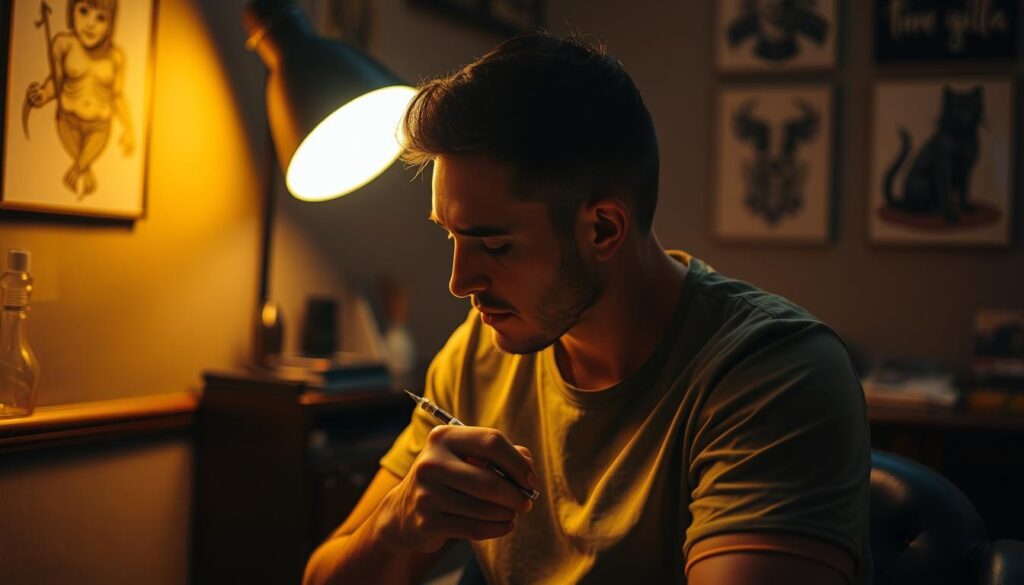
Finding the right tattoo artist makes all the difference. Look for someone who shows clear, healed examples of small work and who explains steps patiently. A good fit reduces surprises and helps your piece age well.
Portfolio fit, communication, and studio hygiene
Start by shortlisting artists with multiple healed behind ear examples and steady linework. Check images for clean edges and consistent shading. That shows they can handle micro pieces.
- Book a consult to confirm placement, size, and readability. Bring exact references and be open to tweaks so designs sit along your curve.
- Vet studio hygiene: barrier film, single-use needles, and visible sterilization are musts for safety and peace of mind.
- Ask how they stencil curved zones and request a second stencil at a different angle. Small shifts can change how a piece reads in photos.
- Review pricing, deposit, and reschedule policy in writing before you book. Confirm touch-up terms for tiny work.
Trust and clear communication matter most. An artist who answers your concerns, outlines aftercare, and makes you comfortable is worth the wait.
“A confident artist will translate a small stencil into a crisp, wearable piece.”
Cost guide: what you’ll pay for a behind ear tattoo
Expect a clear shop minimum for very small pieces. Even a tiny mark needs setup time, single-use needles, and sterile prep. That minimum often ranges from about £40 to £100, depending on city and studio standards.
If your design adds color, shading, or fine detail, you’ll likely move to an hourly rate. Many artists charge roughly £50–£200 per hour. Ask your artist for a time estimate based on your reference so you can plan your budget.
Simple single-line symbols or short script usually sit at the low end of the minimum. Highly detailed micro work can take longer than you expect, so clear, bold shapes are often more cost-effective and age well.
- Ask for a written quote before you book, including deposit and reschedule terms.
- Factor in tips and a possible touch-up—some studios include a complimentary window.
- If you travel for a specific artist, add travel costs and extra time for potential touch-ups.
- Bring a backup design at the same scale if you’re watching costs; your artist can recommend the most efficient option.
“Your final price reflects time, expertise, and hygiene standards that keep you safe and deliver beautiful results.”
| Cost Factor | Typical Range | Why it matters |
|---|---|---|
| Shop minimum | £40–£100 | Covers setup, sterilization, and basic session time |
| Hourly rate | £50–£200 per hour | Used for color, shading, or longer detail work |
| Travel / extras | Variable | Allow for travel, lodging, and tip if you chase a specific artist |
| Touch-up policy | Complimentary window or charged | Check terms so you know if a small correction is included |
Can you hide a behind ear tattoo at work?
If you need to keep your ink low-key at work, simple styling and a few clever products can help.
Quick wins include hair choices, light makeup, and smart accessories. These options let you reveal or hide your small mark based on meetings or events.
Hair, makeup, and accessories for temporary cover
Long hair worn down or a side-swept pony is the easiest daily conceal. It masks the spot naturally and looks polished.
If you wear short styles, try a transfer-resistant concealer or high-coverage foundation. Dab it on gently and set with powder to limit transfer.
- A slim scarf or headwrap covers a small back area and pairs well with office outfits.
- Pick subtle accessories; heavy headbands or headphones can rub fresh work, so avoid while healing.
- Test your cover routine at home to check durability and transfer before an important day.
Pro tip: Stories & Ink notes a skin-tone plaster can work, but it may draw attention. If your workplace is conservative, place options higher or lower to boost natural coverage by hair.
“This spot is easy to reveal or hide; pick your styling each morning based on your schedule.”
Behind the ear tattoos with mythic flair
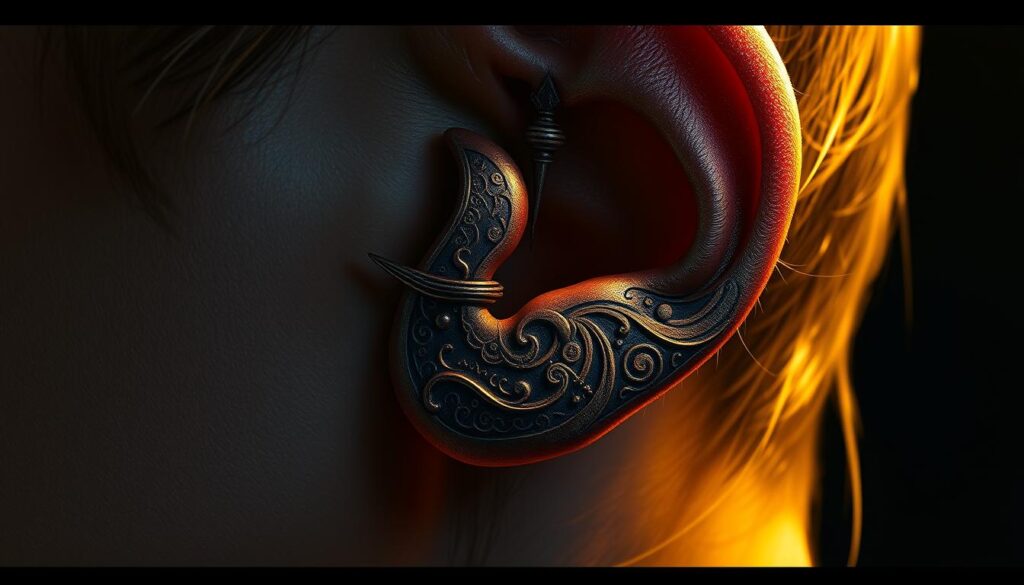
Scale down heroic motifs into clean, iconic shapes that work beautifully near your neckline.
Channel classical power with tiny symbols that read at a glance. Think a micro thunderbolt for Zeus or a minimalist trident for Poseidon. These simple silhouettes make strong tattoo designs without crowding the skin.
Athena’s owl or a single laurel leaf nods to wisdom and victory. An Apollo lyre or a compact sunburst adds radiant flair. Keep lines few and shapes bold so your body holds the mark over time.
For narrative options, pair a Perseus sword with a small star or laurel to create a quiet heroic set. A Greek key fragment can echo your ear curve and give balanced framing.
“Ask your artist to simplify ornate emblems into iconographic forms; it preserves meaning while fitting a tiny canvas.”
- Tip: use thin strokes and small negative space for clarity.
- Consider a single warm accent tone to hint at gold without heavy color work.
- Place motifs so they peek from under hair for a personal, timeless reveal.
Conclusion
When you want a small mark that still says a lot, focus on clarity and placement. You’ve seen clear ear tattoo ideas that suit many styles—from simple symbols to tiny script and celestial accents. Keep your shortlist to clean shapes that follow your curve and how you wear hair.
With realistic expectations about pain, healing, and fading, you can care for new tattoos so they stay crisp. If you’re ready, book a consult, bring scaled references, and confirm price and aftercare before your session.
Final step: pick a favorite, message a trusted artist, and lock a date. Start minimal if you’re unsure—you can always build around a behind ear tattoo later.
